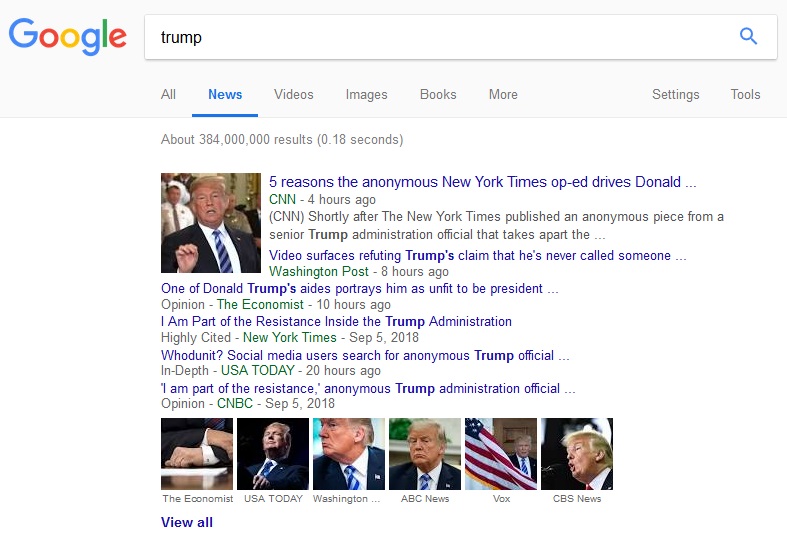Your cart is currently empty!

Is Politics Part of Google’s Algorithm?
Recently, President Trump tweeted concerns that Google is making him look bad.
Google search results for “Trump News” shows only the viewing/reporting of Fake New Media. In other words, they have it RIGGED, for me & others, so that almost all stories & news is BAD. Fake CNN is prominent. Republican/Conservative & Fair Media is shut out. Illegal? 96% of…
….results on “Trump News” are from National Left-Wing Media, very dangerous. Google & others are suppressing voices of Conservatives and hiding information and news that is good. They are controlling what we can & cannot see. This is a very serious situation-will be addressed!
The claim appears to be based on a blog post by Paul Bolyard at PJMedia.com. She Googled “Trump” at Google News and found lots of first page results for “liberal media” such as CNN, CBS, The Atlantic, CNBC, The New Yorker, Politico, Reuters, and USA Today.
Bolyard hardly saw any conservative media, according to a “media bias chart” she used to sort out the left leaning from the right leaning news sources. The conservative contenders included Forbes, the Wall Street Journal, and the Christian Science Monitor, but also Zero Hedge, Hot Air and InfoWars. Very few of the conservative sources had the level of respect and thought leadership found in the “left-leaning” New York Times, NPR, and every major TV network.
So there’s a problem already. Most of the highly respected, well established news sources have been defined as liberal, while most of the conservative sources are neither highly respected nor well established. You might expect the Huffington Post and Fox News to have equal credibility with Google, but setting up the BBC News against Twitchy is a tough match.
Methodology
Bolyard wasn’t running a scientific study. She describes her methodology: “To test the premise, I performed a Google search for ‘Trump’.” Armed with her media bias chart, she found that 96 of the first 100 results she saw were liberal media sources. Since everyone sees different things, the results she sees don’t reveal Google’s algorithm. Nonetheless, she concluded (specifically mentioning the fact that her blog didn’t rank) that Google is heavily biased against conservative news sources.
Google denies the accusation. However, Google is listed on the media bias chart as a left-wing news source.
The Economist, which shows up on the right side of that media bias chart, ran a better test. They wrote a program that searched news for “Trump” each day of 2018 so far. They used a server in Dallas (they’re in the UK) which they cleaned up to avoid “clues” as to its previous searches. They don’t specify further, but at least they didn’t just Google on their office computer. They adjusted for site popularity, since The New York Times is much more popular than PJ Media. They also controlled for the volume of articles about Trump each news source had, and adjusted for trustworthiness, which we know is a major part of Google’s algorithm. Having controlled as many variables as possible, they found no evidence of bias.
They noted that three news organizations, CNN, The Washington Post, and the New York Times, write about Trump every single day. Combined with their stature, this devotion to the keyword obviously gives them an advantage.
Google’s algorithm
We know that Google considers the overall trustworthiness of a website, the authority of the domain, and the quality of the content when it decides whether to show the website in the SERPs. So we used Spyfu to get a machine’s eye view of the overall rankings of three news sites from each side of the media bias chart. You’ll see in the screenshot below that Wired, Politico, and Vox are considered more authoritative than the three rightist news outlets huddled at the bottom of the screen shot.

We also know that Google doesn’t like spammy-looking websites with excessive ads and clickbait headlines. Check out the three sites from the left side of the media bias chart:



All three use a typical online news design, reasonably respectable headlines, and limited ads.
Compare that with the three from the right side:



Just a reminder: we didn’t make up the list of news sources; we’re using the chart from the blog that made the initial claim of bias. We’re also not comparing the sleaziest right-wing sources with the most established left-wing sources. We just picked a random group from the middle. It’s hard to avoid the conclusion that the conservative news sites as defined in the accusation are generally less likely to rank than the liberal ones.
Does this matter to you?
In our experience, the political leanings of website owners don’t have any effect on the performance of websites. We typically try to avoid political statements on websites offering goods and services which are not related to politics. This is not because of Google, but because we think it’s possible that a statement about politics at a dental hygeinist’s website might make a visitor decide to have her teeth cleaned elsewhere. Why take the chance?
But just in case you were worrying about this, we’re pleased to report that the evidence is really not on the side of the accusers. The difference in performance between the two groups of websites can easily be explained by ordinary facts about the websites themselves.
by
Rebecca Haden
Tags:

Leave a Reply